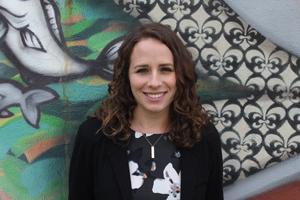Research
Get to Know Them: Jessica Gephart

Jessica Gephart, a new environmental science professor, specializes in the global seafood trade.
The next time you sit down to eat a smoked salmon or a fried flounder, remember this: A whole lot happened before that fish ended up on your plate. Jessica Gephart, a new environmental science professor at American University, has focused on the global seafood trade and its role in sustainable and resilient food systems.
“We’re at a time where we can get food from all sorts of distant places, which has some big benefits. But there might be some novel risks to that, in terms of food security,” says Gephart. “There’s also this question about environmental impacts, particularly when consumers don’t have to face the environmental impacts of food production.”
Gephart, who teaches in the College of Arts and Sciences, is one of 15 new tenure-line faculty members at AU. This profile is part of a new series spotlighting recently hired professors.
Grains, Food Systems, and Fishes Out of Water
In some ways, Gephart traces her curiosity about seafood trade to the 2008-era international grain crisis, a time of soaring prices, droughts, grain hoarding, and export bans.
“I got really interested in questions around that within the food system, and I had been working in aquatic ecology labs. And it started out as a simple question of, ‘Oh, all these studies are really focused on grains, what does it look like for seafood?’ And that started as a side project, but really, it became clear that there was a lot of interesting and important work to do in that space.”
Even now, with a lot more research under her belt, she remembers how her thinking was shaped as an undergrad. She was studying abroad at the University of Ghana and taking classes in the fisheries program, and she saw first-hand the importance of seafood in the human diet.
“That sparked interest in not just thinking about fisheries in the way we often do—how we study them and manage them in the water. But thinking a lot more about, ‘What happens to the fish after they’re out of the water?’”
From Reading Rainbow to Reading Data
Despite that sea-based preoccupation, Gephart grew up in the decidedly landlocked city of Findlay, Ohio. She remembers fishing with her dad and sister, but was less engaged in the pastime than she was in organizing her tackle box. “I wouldn’t say there was a deep interest,” she laughs now.
Yet at a young age, she wanted to be a marine biologist. Like the ever-popular “astronaut,” marine biologist is one of those occupations seemingly every little kid aspires to be. But Gephart’s family encouraged her childhood hobby.
“I think I was in second grade when I saw a Reading Rainbow episode about manatees, and I really fell in love with them. I proceeded to then receive an adopted manatee every year for my Christmas and birthday from my grandma. So I had probably an entire herd of symbolically adopted manatees,” she recalls.
Gephart also liked art, and while earning her bachelor’s degree at Miami University, she considered an art restoration focus through intensive chemistry classes. But she soon gravitated toward interdisciplinary fields of zoology and environmental science, with minors in mathematics and statistics. In graduate school at the University of Virginia, an initial desire to study zebra mussels in the Hudson River gave way to her work on the seafood trade. While her research focus started to diverge from her PhD adviser Mike Pace’s work, he was still an invaluable mentor.
“Mike was extremely supportive in going through that process, thinking about what made the most sense for me in terms of my current goals,” she says.
She earned her PhD in environmental science from UVA in 2016.
Traveling and Learning
Though much of Gephart’s research is data-driven and office-based, her work afforded her the chance to visit far-flung places and cosmopolitan cities. In addition to the aforementioned Ghana experience, she spent a summer at the International Institute for Applied Systems Analysis near Vienna, Austria, and she also got grant money to work at the Stockholm Resilience Centre, a leader in social-ecological systems.
“I didn’t expect choosing an area that is so computer-focused would create so many opportunities to travel other places,” she says. “I feel like I really just lucked into that.”
More recently, she has worked with a team in Kiribati in the Pacific Islands. Broadly speaking, they’re trying to understand the health implications of degrading reefs, with fishing communities becoming more reliant on imported processed foods. They’ve interviewed village leaders, fishermen, and public officials, and Gephart closely observes what food products are available and how the markets function.
“It’s to ensure that I’ll have an understanding of the food system when I’m just looking at raw data on my laptop,” she explains.
Ideal Location
Despite these excursions abroad, Gephart maintains her Ohio roots and married her high school sweetheart. She recently did a postdoc in nearby Annapolis, and her husband worked on Capitol Hill before joining an education policy nonprofit. Looking to stay in the area, Gephart says this job opened up at just the right time.
“It was a really convenient and ideal location for doing my kind of work, which tends to be more global with a lot of government data,” she says. “So I was really excited when I saw a call for a position here at American.”

